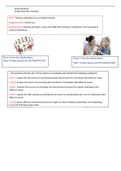Skylar Beckham
Student Number: 9654467
Unit 5: Meeting Individual Care and Support Needs
Assignment title: Ethical Care
Learning Aim A: Examine principles, values and skills which underpin meeting the care and support
needs of individuals.
Photo is from the website below: Photo is from the website below:
https://images.app.goo.gl/cUhqTQaf9FsPz4Js8
https://images.app.goo.gl/F2Jv6146xaqryzD4A
The purpose and the aim of this report is to evaluate and answer the following questions:
5/A.P1 Explain the importance of promoting equality and diversity for individuals with different needs
5/A.M1 Analyse the impact of preventing discrimination for individuals with different needs.
5/A.D1 Evaluate the success of promoting anti-discriminatory practice for specific individuals with
different needs.
5/A.P2 Explain the skills and personal attributes necessary for professionals who care for individuals with
different needs.
5/A.M2 Assess different methods professionals might use when building relationships and establishing
trust with individuals with needs.
, Skylar Beckham
Student Number: 9654467
P1. Explain the importance of promoting equality and diversity for individuals with different needs.
The definition of Equality: “Everyone having equal access to the services they need, that is, receiving
a service of equal quality that meets their personal needs, no matter where they live or how they
live their lives”. Information taken from (Health and social care, student book 1, Marilyn Billingham,
page 236)
The definition of diversity: “A variety or range of things”. Information taken from (Health and social
care, student book 1, Marilyn Billingham, page 237)
The definition of discrimination: “Treating a person or group of people differently from others”.
(Health and social care, student book 1, Marilyn Billingham, page 237)
A way in which equality is upheld within the health and social care sector is through legislation.
Legislation is an act of parliament when they create new laws or changes to an existing law. An
example of a legislation that promotes equality and diversity in the health and social care sector is
the Equality Act,2010. Which protects people from discrimination in the workplace, making the
workplace a fair environment for both employees and employers and it also sets out ways in which it
is unlawful to treat someone. Another legislation that promotes equality and diversity is the Human
Rights Act,1998. Which means public organisations e.g. hospitals, government, local councils etc.
must treat everyone equally and with dignity and respect, it also sets out fundamental rights and
freedoms that individuals in the united kingdom have access to: for example the rights to security,
fair trial, freedom, expression and protection from discrimination.
The importance of promoting equality and diversity for individuals with specific needs will produce
many benefits for the individual. One benefit would result in the individual feeling that they are
valued, and this would later result in them feeling comfortable and have a sense of belonging,
another benefit would be it gives everyone an equal opportunity and encourages mutual respect for
everyone.
For example, an individual with specific needs would be Valerie from case study one. Valerie has a
hearing impairment but has never been assessed for any support to improve her hearing. The
importance of promoting equality for Valerie different needs is to ensure that she can access the
right healthcare treatment like everyone else and is valued to the same level as the rest of her peers.
The benefit of equality being promoted and shown to Valerie’s needs other than an improvement to
her hearing and health is it will result in her feeling valued and acknowledge. Valerie is a vegetarian.
The importance of promoting diversity for Valerie different needs shows her that you respect and
value her lifestyle choices. Which will result in her feeling respected by her service providers and
appreciated which can also lead to a boost in her self-esteem.
5/A.P2 Explain the skills and personal attributes necessary for professionals who care for individuals
with different needs.
The definition of skills: the ability to do something well or to be expert in something. (Health and
social care, student book 1, Marilyn Billingham, page 239)
The definition of personal attributes: the qualities or characteristics that make an individual who
they are e.g., their personality. (Health and social care, student book 1, Marilyn Billingham, page
239)





